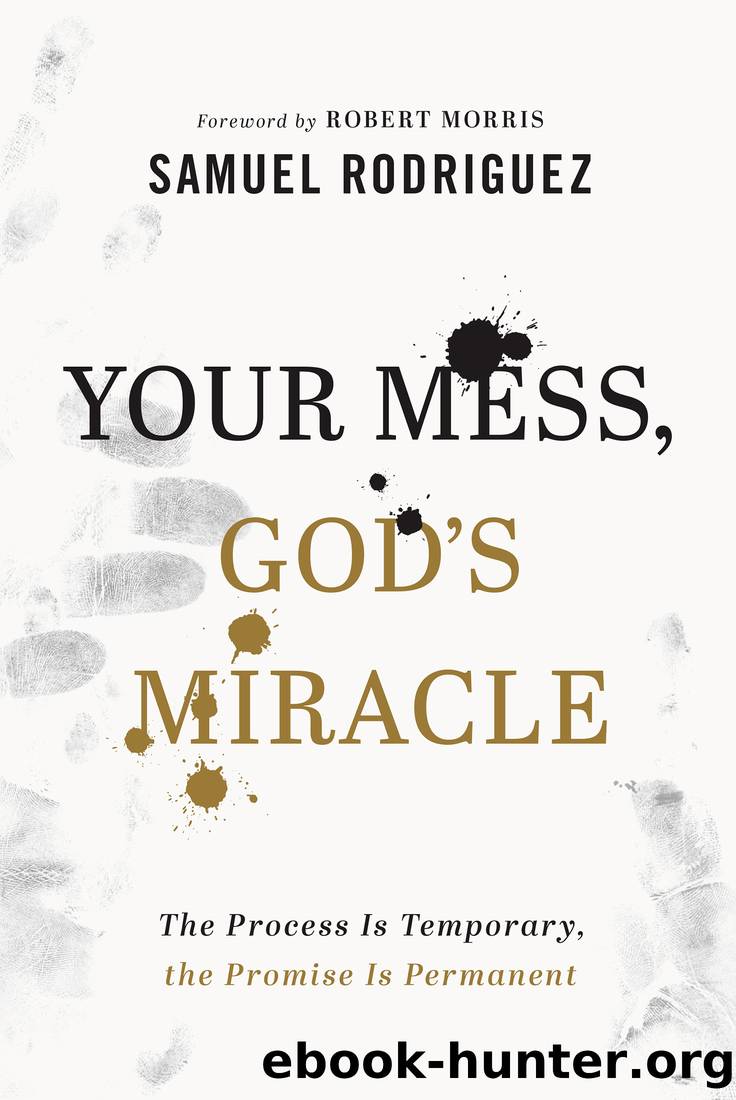Your Mess, God's Miracle by Samuel Rodriguez

Author:Samuel Rodriguez
Language: eng
Format: epub
Tags: Pentecostal & Charismatic;Faith—Religious aspects—Christianity;Conduct of life—Religious aspects—Christianity;Hope—Religious aspects—Christianity;Christian life;REL079000;REL012120;REL012040
Publisher: Baker Publishing Group
Published: 2023-02-07T00:00:00+00:00
Subjective Bias
You see, the story you tell yourself about your identity, your purpose and your relationshipsâincluding how you view Godâdevelops in large part by how you draw conclusions based on your life experiences. Simply put, most of us develop false beliefs based on inaccurate assumptions, othersâ opinions, subjective bias and traumatic experiences that distort the truth of who God says we are, how He wants us to live and the purpose He created us to fulfill.
Sometimes we glimpse the dissonance between the messages we tell ourselves and the objective evidence outside ourselves. Many people, for instance, often fixate on seeing themselves and their body image based on negative criticism and shaming from others. At an early age they were told that they were fat or thin, unattractive or stupid, untalented or unlovable. The messages might or might not have been direct and overt. Words, attitudes and eventsâfrom parents, siblings, friends, peers and mediaâcommunicate comprehensively.
But the debilitating impact is usually the same because we internalize those negative messages into a hypothesis. We assume that we must be who and what others say we are, and then we interpret our perceptions of ourselves, others and everything around us through these false beliefs. We do not see clearly; instead, we see through a set of false beliefs that become self-reinforcing and sometimes self-fulfilling.
Those painful, shaming messages that we carry poison our perspective. Despite how healthy and physically fit someone can be as an adult, for example, she can still consider herself too thin or too heavy based on the messages she perceived from her family, peers and culture. When she sees herself in a photo or mirror, the image staring back at her reflects the painful emotions of what others have told her rather than the accurate vision of present reality.
Body image is not the only emotional and psychological area that is affected by our false beliefs. Many people often have highly critical and perfectionistic criteria for their appearance, intelligence, work performance, achievements, relational happiness, parenting and financial earning powerâor whatever aspect was emphasized and valued as their self-worth was defined. Their views of themselves are flawed by the conclusions they have formed from past events, conversations and relationships.
In psychology, subjective bias is the term used to describe the way participants in a study or experiment behave in ways to meet the expectations of those conducting the research. Essentially, it is a way of conforming and trying to perform well and get validation by giving those in charge what you think they want.2
This same tendency operates on some level when you filter your way of seeing with those past messages you have internalized into beliefs. Instead of getting validation from researchers, though, you validate the false beliefs that are holding you prisoner, no matter how critical, inaccurate and unhealthy they may be. Simply put, your subjective bias prevents you from seeing the truth of Godâs perspective.
How have you experienced this kind of self-critical bias? What false beliefs do you struggle to shake? What
Download
This site does not store any files on its server. We only index and link to content provided by other sites. Please contact the content providers to delete copyright contents if any and email us, we'll remove relevant links or contents immediately.
| Anglican | Baptist |
| Book of Common Prayer | Calvinist |
| Episcopalian | Inspirational |
| Lutheran | Methodist |
| Pentecostal & Charismatic | Presbyterian |
| Quaker | Seventh-Day Adventist |
| Shaker | Theology |
Angels by Billy Graham(1926)
How To Be Born Again by Billy Graham(1781)
Peace with God by Billy Graham(1689)
Unbroken Curses by Rebecca Brown & Daniel Yoder(1575)
God's Prophetic Symbolism in Everyday Life by Adam Thompson & Adrian Beale(1497)
The School of Biblical Evangelism by Ray Comfort(1438)
Call by Rick Joyner(1430)
Martin Luther: The Man Who Rediscovered God and Changed the World by Eric Metaxas(1399)
Power over the Enemy by John Osteen & Joel Osteen(1354)
Jonathan Edwards: A Life by Marsden George M(1236)
Fresh Wind, Fresh Fire by Jim Cymbala(1234)
Prayers That Bring Healing and Activate Blessings: Experience the Protection, Power, and Favor of God by John Eckhardt(1222)
Liturgy of the Ordinary by Tish Harrison Warren(1220)
The Supernatural Power of a Transformed Mind Expanded Edition: Access to a Life of Miracles by Bill Johnson(1207)
Unmasking the Devil: Strategies to Defeat Eternity's Greatest Enemy by John Ramirez(1206)
An Altar in the World by Barbara Brown Taylor(1195)
Reformation Theology by Littlejohn Bradford(1187)
Seeing the Voice of God: What God Is Telling You through Dreams and Visions by Smith Laura Harris(1142)
Martin Luther by Mansch Larry D.; Peters Curtis H.;(1131)
